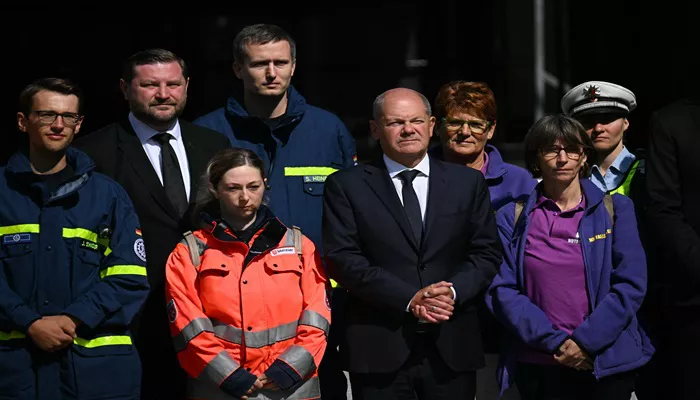SOLINGEN, Germany (AFP) — The recent knife attack in Solingen, Germany, carried out by a Syrian man and claimed by the Islamic State, has ignited strong emotions and deepened the ongoing debate over immigration policy in the country. The attack, which left three people dead and eight others wounded at a local festival, has divided opinions among residents.
Vivienne Vetter, a long-time Solingen resident originally from Poland, expressed her anger towards the influx of refugees into the city. She believes the arrival of migrants is overwhelming local resources and contributing to social issues. “They don’t learn German,” she said, blaming them for taking away childcare spots, affordable housing, and other resources. Vetter, who works in elder care, lives just a short distance from the site of the attack and feels the lack of integration is a significant problem.
The attack has also prompted fears of increased social division. Kadir Ayten, a Turkish man who has lived in Solingen for two decades, worries that the incident will lead to greater suspicion and hostility towards foreigners. “Such things can divide society. People will be more fearful of foreigners,” said the 46-year-old taxi driver. He emphasized that the attack had “nothing to do with Islam.”
The differing reactions in Solingen reflect the broader national debate on immigration, which has been reignited by the attack. Some residents, like Wolfgang Matthes, see the incident as a turning point in how Germany should handle asylum seekers. “The government has to toughen its asylum policy,” said the 61-year-old resident.
Germany has faced increasing pressure on its immigration system, particularly with the influx of refugees fleeing the war in Ukraine. The refugee center where the alleged attacker lived is located just 300 meters from the site of the violence and has been housing migrants since December 2022.
In response to the attack, German Chancellor Olaf Scholz visited Solingen, where he pledged to tighten immigration rules. However, Solingen’s mayor, Tim Kurzbach, called for calm, emphasizing that the issue extends beyond just Solingen and concerns the entire country.
The aftermath of the attack has also seen a rise in political tensions, with left-wing groups and the youth organization of the far-right AfD party holding opposing demonstrations. The AfD, which advocates for stricter immigration controls, is expected to gain support in upcoming regional elections in eastern Germany.
Resul Salihu, an 18-year-old Serbian who has lived in Solingen his entire life, urged against blaming migrants for the attack. He warned that generalizing about immigrants could lead to increased support for the AfD, which he sees as a troubling development.
As Germany continues to grapple with immigration challenges, the Solingen attack serves as a stark reminder of the complex and often contentious nature of the debate surrounding refugees and integration.


